
 Image: Matt Smith
Image: Matt Smith
At a glance
Expert’s Rating
Pros
Bright, sharp SDR imageGood color gamut and accuracySolid build quality and ergonomic standGreat motion clarity at 120Hz or 144Hz
Cons
Disappointing HDR performanceOdd menu choices for creators Modest USB connectivity
Our Verdict
Dell’s G3223Q joins the other 32-inch 4K monitors in offering a compromised experience. It has good SDR image quality, superb motion clarity, and is compatible with the latest game consoles thanks to HDMI 2.1 support and a refresh rate up to 144Hz. But disappointing HDR performance and weak options for creators hold it back from a ringing endorsement.
Price When Reviewed
$1099
Best Prices Today: Dell G3223Q
RetailerPrice
Looking for a 32-inch 4K monitor that’s great for both PC and console gaming? You face a hard choice. HDMI 2.1 support with high refresh rates is now widespread, but high pricing and so-so performance remains a problem for this category. The Dell G3223Q is among the better options, but far from flawless.
Note: This review is part of our ongoing roundup of the best gaming monitors. Go there to learn more about competing products, what to look for in a gaming monitor, and buying recommendations.
Dell G3223Q: The specs
The Dell G3223Q’s specifications lean towards console gaming. It has two HDMI 2.1 ports, a refresh rate of up to 144Hz, and AMD FreeSync Premium Pro. This is the ideal combination for PlayStation 5 and Xbox Series X owners.
Display size: 32-inchNative resolution: 3,840 x 2,160Panel type: IPSRefresh rate: Up to 144HzHDR: VESA DisplayHDR 600 certifiedAdaptive sync: AMD FreeSync Premium ProPorts: 2x HDMI 2.1, 1x DisplayPort, USB Type-B upstream, 2x USB-A with Power Charging, 3.5mm headphone jackStand adjustment: Height, tilt, wwivelVESA mount: Yes, 100x100mmSpeakers: NonePrice: $1,099 MSRP, around $825 typical
That’s not to say the G3223Q sacrifices PC gaming. It has a DisplayPort port, of course, making high-refresh gameplay easy to access no matter the device you own. The monitor is also VESA DisplayHDR 600 certified— though, as I’ll explain, HDR remains a sore spot.
Dell G3223Q: Design
The Dell G3223Q riffs on the same design cues in all Dell gaming monitors. You can expect a basic, unexceptional look from the front, with modest bezels and a bottom chin that includes the Dell logo. The back is an expanse of gunmetal plastic adorned with blue LED accents. Dell’s design choices will please gamers who prefer less flair.
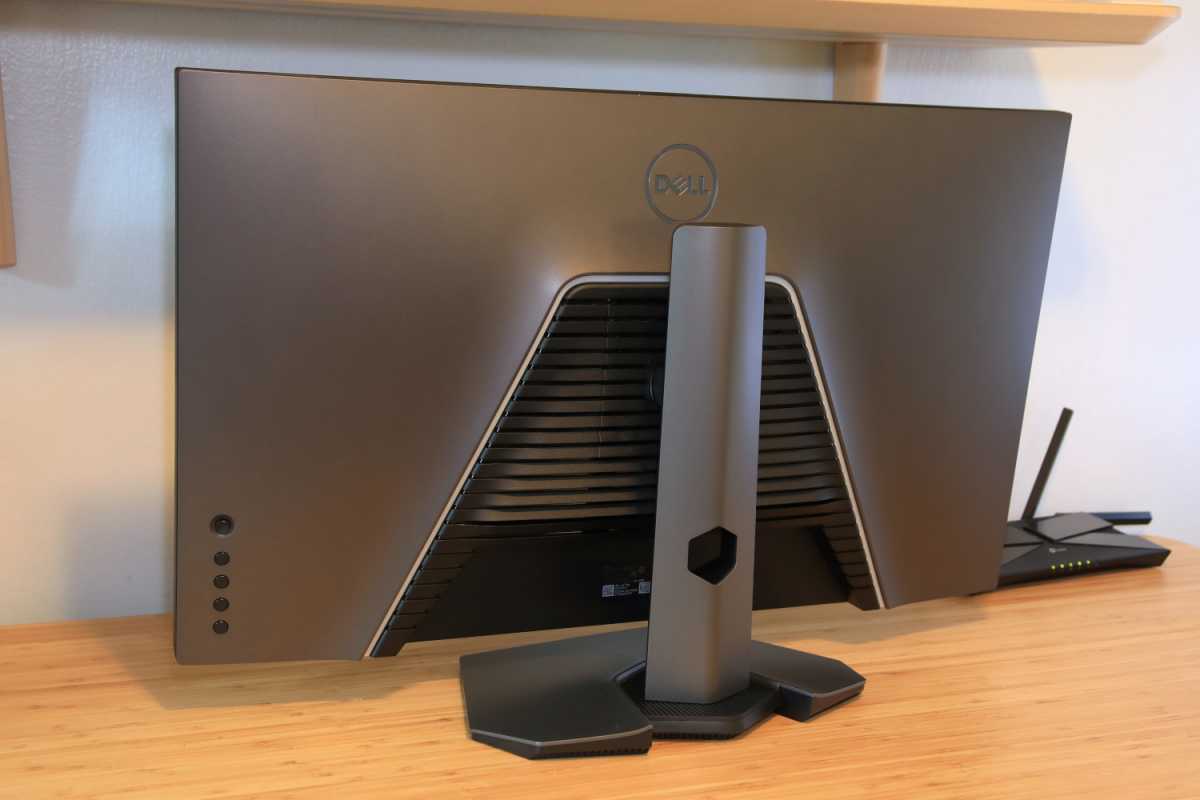
Standard Dell gaming monitor design focuses on solid construction with minimal flair.
Standard Dell gaming monitor design focuses on solid construction with minimal flair.
Matt Smith
Standard Dell gaming monitor design focuses on solid construction with minimal flair.
Matt Smith
Matt Smith
Though entirely plastic, the G3223Q feels durable when handled. There’s minimal creak or flex to surfaces and most plastics have a hard, slightly rough texture that seems likely to resist and obscure scratches. Build quality is a match for Acer Predator and Asus ROG displays, and slightly better than Samsung’s Odyssey and LG’s Ultragear line.
A modest stand with a flat base holds the G3223Q in place. It’s not as hefty as the stand found on premium Alienware, BenQ, and Samsung monitors, but still keeps the monitor balanced. In truth, I prefer this stand to those of more expensive alternatives. The flat, small base and narrow neck reduces the monitor’s footprint on your desk. A 100x100mm VESA monitor mount is available for adding a third-party monitor stand or arm.
Dell G3223Q: Features and menu
This monitor ships with two HDMI 2.1 ports. That, along with a refresh rate of up to 144Hz and AMD FreeSync Premium Pro, makes the Dell G3223Q an ideal display for use with modern game consoles like the PlayStation 5 and Xbox Series X. It also has DisplayPort for connecting your PC, of course.
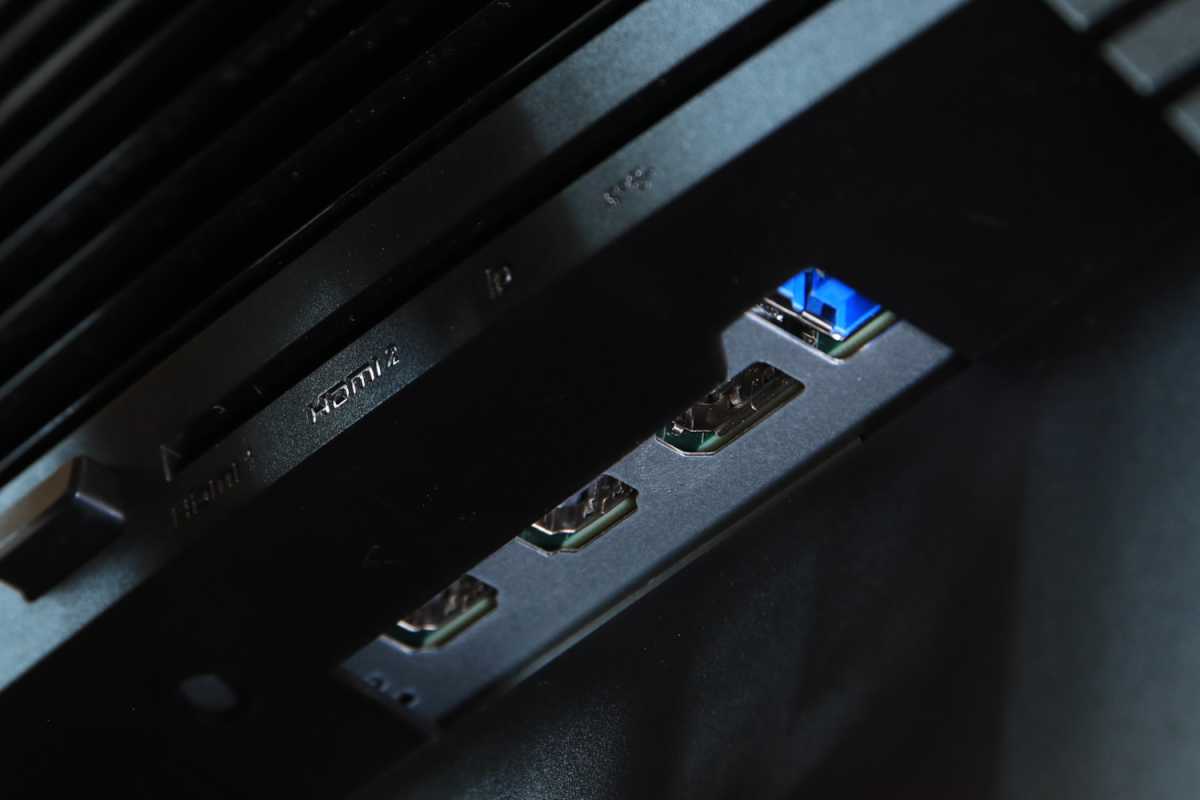
Two HDMI 2.1 ports and a DisplayPort allow for connectivity with the console of your choice.
Two HDMI 2.1 ports and a DisplayPort allow for connectivity with the console of your choice.
Matt Smith
Two HDMI 2.1 ports and a DisplayPort allow for connectivity with the console of your choice.
Matt Smith
Matt Smith
USB connectivity is modest. There’s a single USB Type-B upstream port which drives two USB-A 3.2 Gen 1 ports on the front left chin. Their location makes them easy to access, at least, but more ports would be appreciated. I also find it odd that Dell’s less expensive G3223D includes USB-C, while this high-end model does not.
The monitor’s on-screen menu system is controlled with a joystick. It’s easy to use and provides access to a variety of adjustments. This includes dedicated sRGB and DCI-P3 color modes; custom color with hue, gain, and saturation adjustments; and several gamma options.
More demanding creators will like these features, but there’s a problem. They’re tied to very specific modes. The Creator mode allows adjustment of color gamut and gamma, but not color. The Custom Color mode provides detailed color adjustment, but not gamut or gamma. There’s also limited color temperature adjustment.
Gamers might not care about these features. Many will be happy to leave the monitor in standard mode. The RPG mode also looks nice. For creators, though, this could be a deal breaker.
Dell G3223Q: SDR image quality
The Dell G3223Q’s SDR image quality provides reason to overlook the quirks of its menu system. Though not exceptional, it’s a good all-rounder and does not have the weaknesses that are found in some competitors.
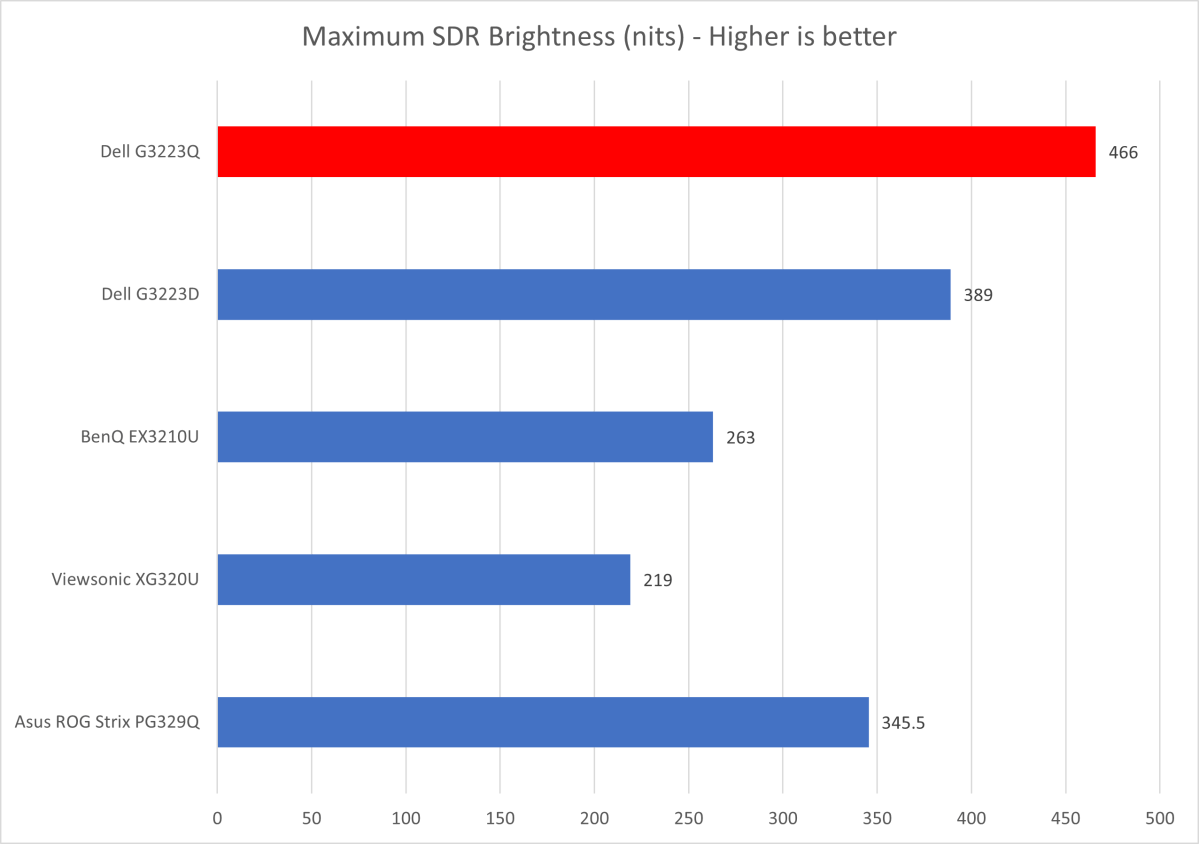
Matt Smith
Matt Smith
Matt Smith
Maximum SDR brightness comes in at 466 nits, which is far higher than the competition and excellent for any monitor. This translates to a striking image that can hold up in brightly lit rooms that could make competitors look dim.
Those using the monitor in a light-controlled room will likely want to use the monitor at far below its maximum brightness. I found a setting of around 40 percent most comfortable.
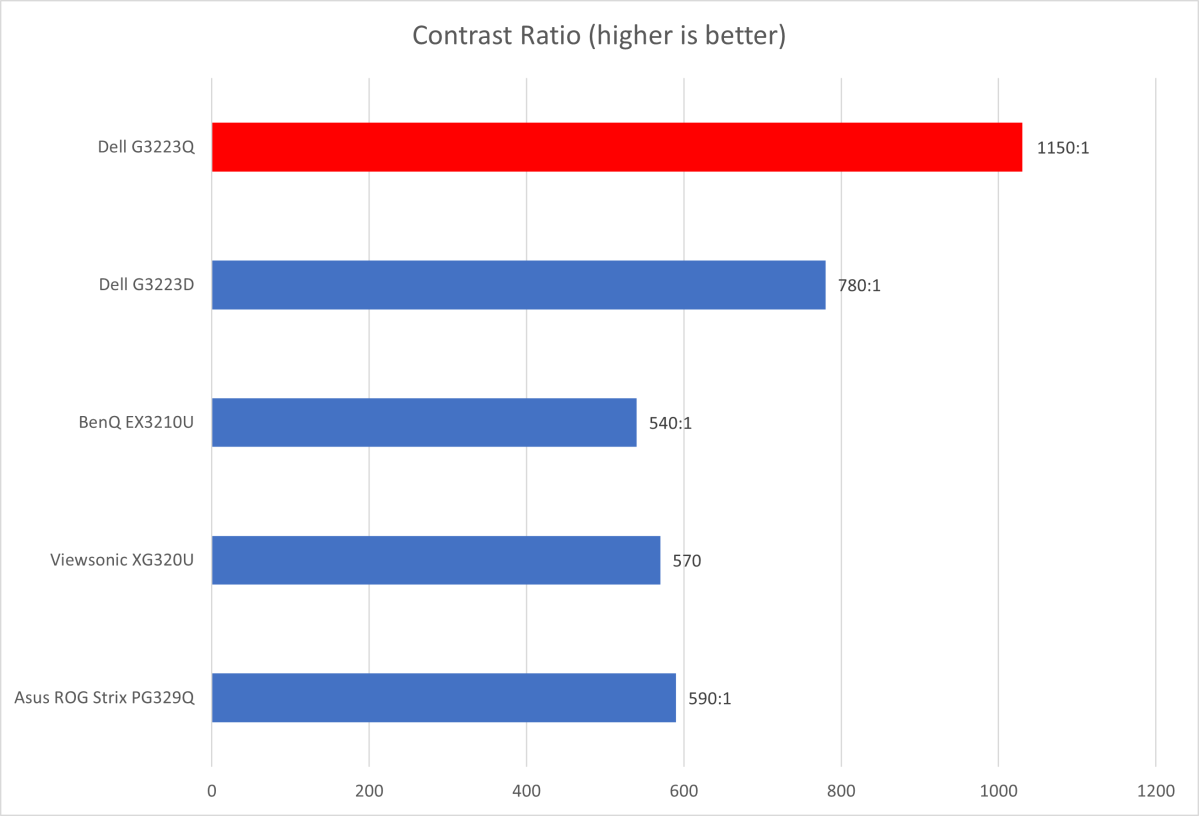
Matt Smith
Matt Smith
Matt Smith
The contrast ratio test reported a maximum ratio of 1150:1. This ratio is not spectacular, but it’s much better than many of Dell’s direct competitors. The G3223Q looks richer and provides a better sense of depth than many of its peers.
This is noticeable in games, streaming shows, and movies, where the low contrast of competitors like the BenQ EX3210U and Viewsonic XG320U can have a flat, simple look.
These competitors also suffer slightly more noticeable “IPS glow,” giving a hazy cast to scenes that should be a deep shade of black. The G3223Q also has this problem—just to a lesser degree.
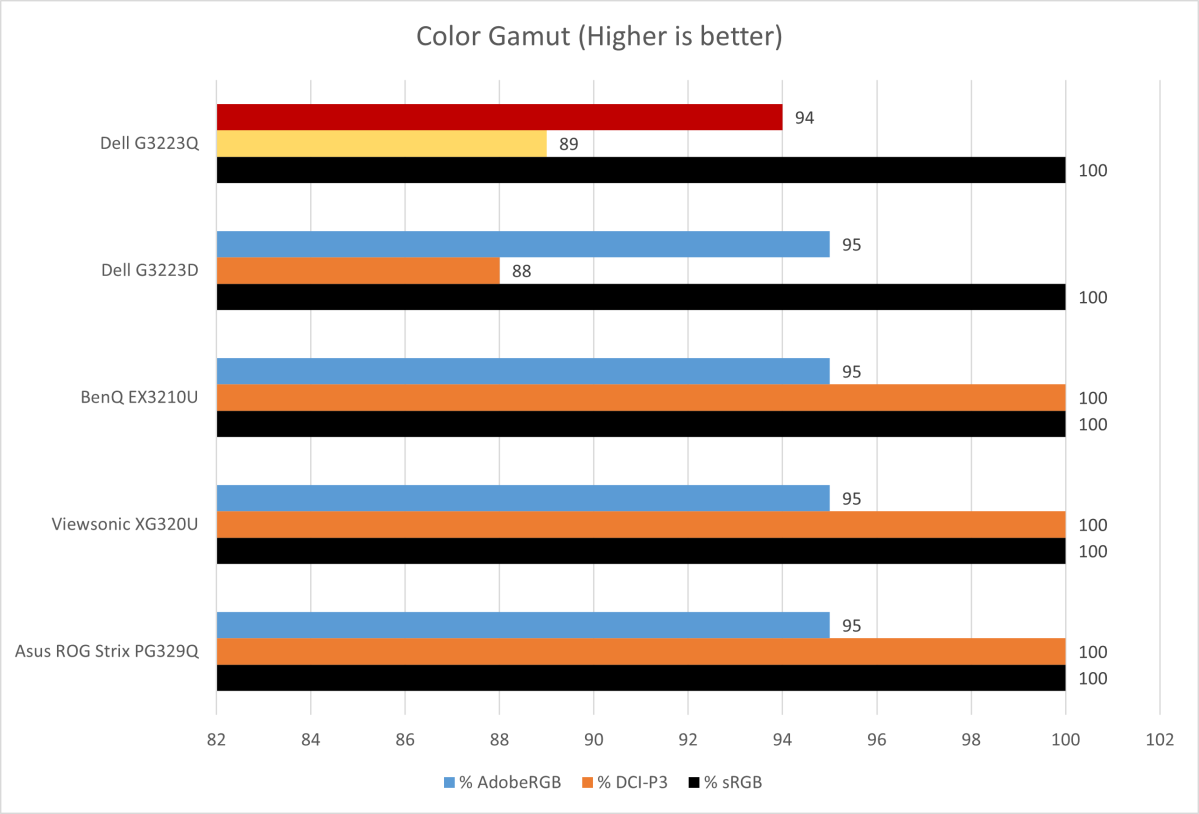
Matt Smith
Matt Smith
Matt Smith
Color gamut is technically a weakness when compared to some similar alternatives. The monitor can reach only 94 percent of DCI-P3 and 89 percent of AdobeRGB.
This is right on the border of what might be considered a “wide gamut” monitor. BenQ, Viewsonic, and Asus offer monitors with a significantly wider color gamut, which means they can display colors the G3223Q can’t achieve.
Still, the G3223Q’s color gamut is solid. Most games are not created for a wide color gamut, so the difference is less important to gaming. This will stand out most to creators who have very specific needs.
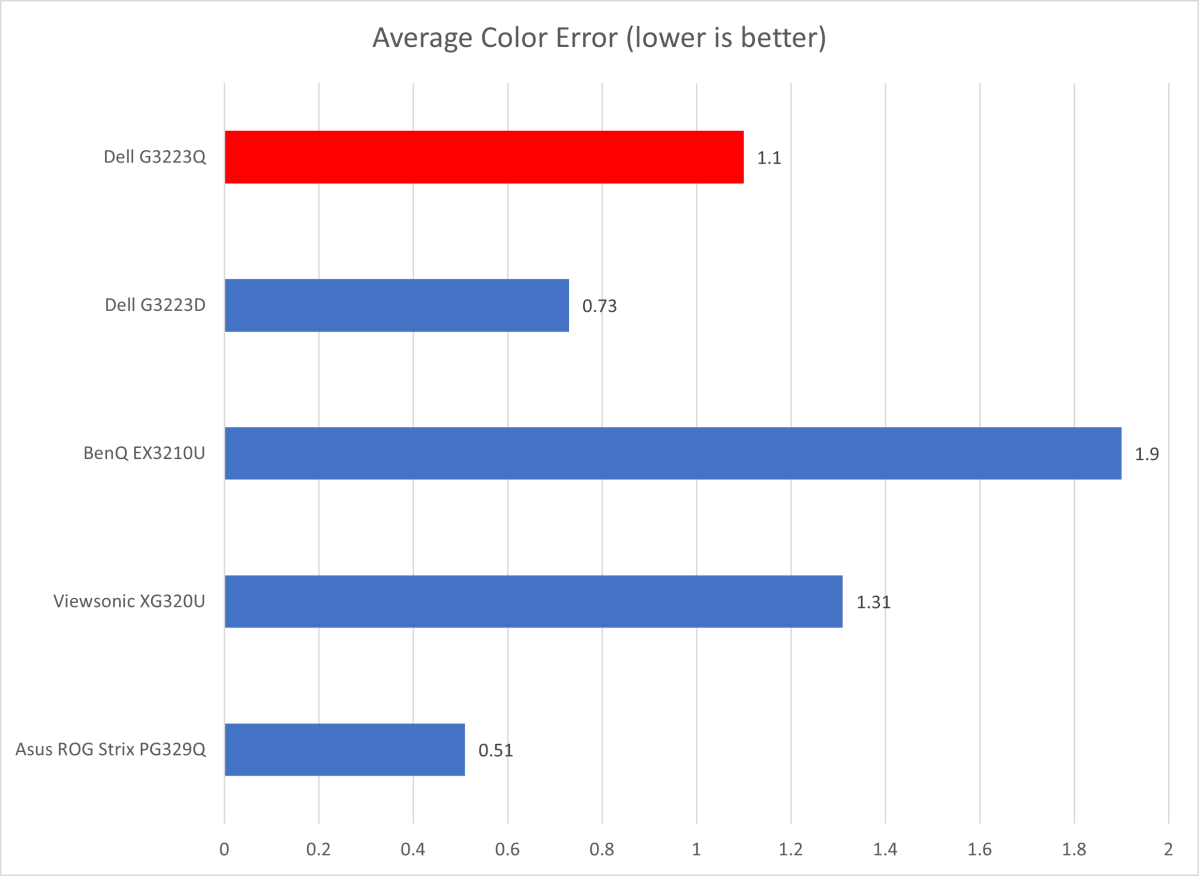
Matt Smith
Matt Smith
Matt Smith
It’s a similar story for color accuracy. The G3223Q had an average error of 1.1, which is technically mid-pack for this set. Still, this is a good result for out-of-box color accuracy and should be adequate for most owners. Colors appear realistic and believable, though generally over-saturated at the extremes. However, in my experience most people prefer the oversaturated look, so I wouldn’t call this a problem.
My testing reported a default gamma of 2.4, which is off the preference of 2.2. This means content will often appear darker than intended. This can add to the sense of contrast but may also obscure details in dark areas of an image. Gamma can be adjusted, although, as noted, only in Creator Mode. The color temperature came in at 6200K, which is a bit warm and reddish but hard to notice outside of a direct comparison with another monitor.
On balance, the Dell G3223Q delivers an attractive experience that beats similarly priced competition. The monitor’s good contrast ratio, solid color, and high brightness make it ready to provide a punchy, vibrant image in any room. And don’t forget—this is a 32-inch, 4K monitor. Sharpness is excellent. Games with detailed textures look great. Fine edges on 3D models show little shimmering, even in games with lackluster anti-aliasing, such as Final Fantasy XIV. 4K resolution also means creators can work on UltraHD video content and high-resolution images while viewing this content at (or, at least, close to) the native resolution.
Dell G3223Q: HDR image quality
Unfortunately, the Dell G3223Q continues the company’s problems with HDR.
The monitor’s default HDR is labeled Desktop. It turns on or off depending on whether HDR is enabled in Windows 11 or the application you’re using. The G3223Q always detected an HDR signal and activated HDR automatically. I measured a maximum sustained brightness of 526 nits, which is very high.
However, this default mode is a bit lackluster. It appears undersaturated and flat. The VESA DisplayHDR 600 mode is better but turns on local dimming, a technique that selectively turns on or off portions of the backlight depending on what is displayed. This is an edge-lit monitor with just a handful of dimming zones, so this behavior can lead to noticeable bright stripes and blotches.
There are two other HDR modes: Game HDR and Movie HDR. These don’t appear to have the backlight dimming, but I still noticed variance in brightness in transitions between bright and dark scenes.
This is a problem for the G3223Q, as this monitor specifically targets HDR gaming on both PC and console. HDR games do deliver more punch than SDR, but no HDR mode delivers good results.
Dell G3223Q: Motion clarity
The Dell G3223Q has a maximum refresh of 144Hz. This allows 4K/120Hz gameplay on the Xbox Series X and PlayStation 5 and 4K/144Hz on PC. Gameplay is extremely smooth at a refresh rate of 120Hz or 144Hz, as is true of most high-refresh displays.
AMD FreeSync Premium Pro is the only official adaptive-sync standard supported. However, Nvidia G-Sync worked in my testing on an RTX 3060 laptop and a GTX 1080 Ti graphic card.
Motion clarity is excellent at high refresh rates. Fast-moving objects retain significant detail and fast camera pans produce minimal blur. This makes it easy to pick small objects in a scene while moving quickly.
The G3223Q is closely matched by the competition. A variety of 32-inch monitors provide good motion clarity at up to 144Hz. These include the Viewsonic Elite XG320U, BenQ EX3210U, and Gigabyte Aorus FI32U, among others.
mentioned in this article
BenQ Mobiuz EX3210U
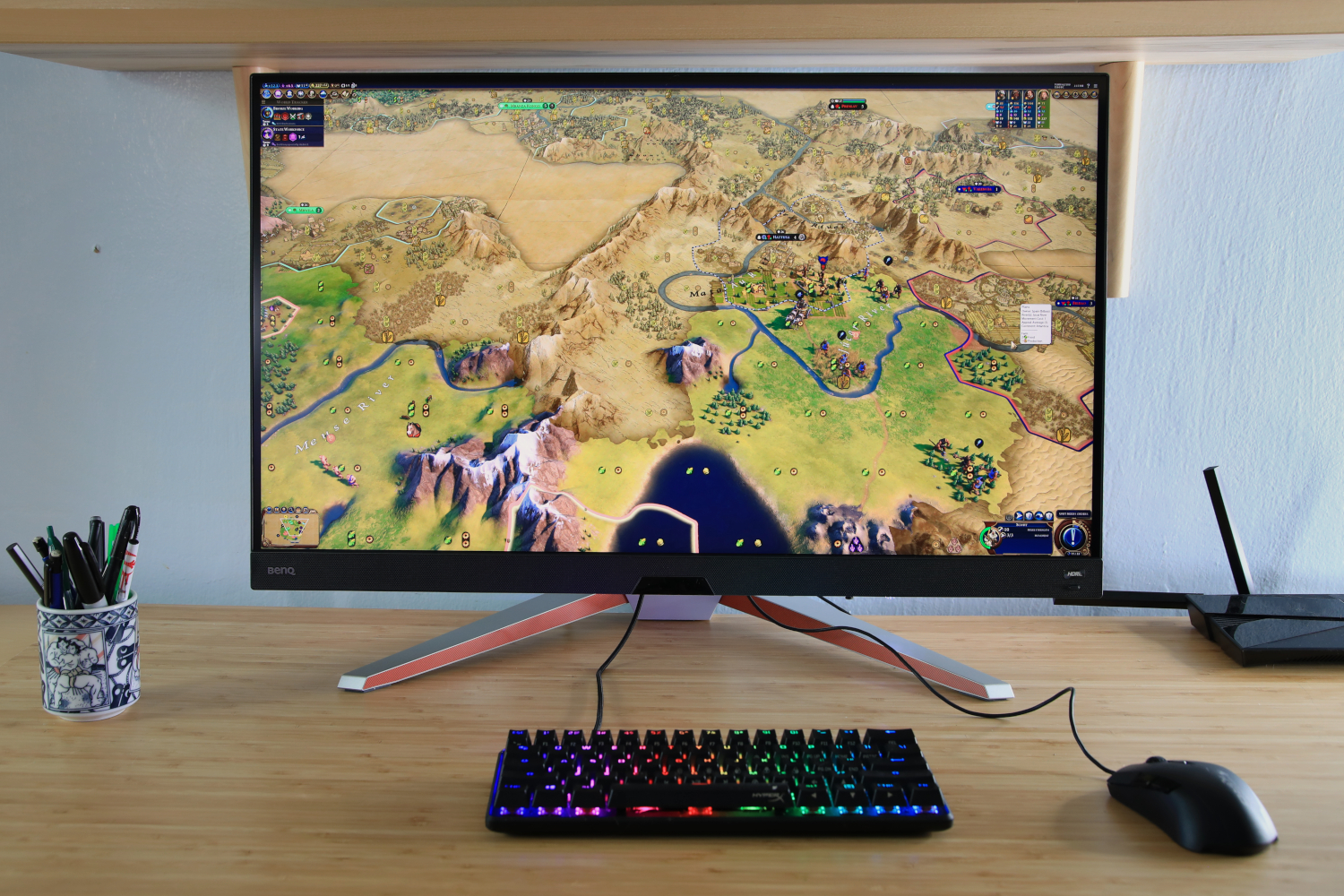 Read our reviewPrice When Reviewed:$1099.99Best Prices Today:$649.99 at Amazon | $649.99 at B&H | $649.99 at Best Buy
Read our reviewPrice When Reviewed:$1099.99Best Prices Today:$649.99 at Amazon | $649.99 at B&H | $649.99 at Best Buy
Final thoughts
Dell’s G3223Q is a conflicted monitor. It has good SDR image quality, superb motion clarity, and works very well with the latest game consoles thanks to HDMI 2.1 support and a refresh rate up to 144Hz. The monitor’s HDR is disappointing, however. It also misses the mark for creators due to some decisions in the monitor’s menu system.
Your choice is complicated by the fact that none of the 32-inch 4K HDR monitors in this price range are ideal. Those who want great HDR will need to upgrade to a much more expensive Mini-LED monitor, such as the Viewsonic XG321UG or Asus ROG Strix PG32UQX, or side-step to Alienware’s ultrawide OLED.
mentioned in this article
Alienware AW3423DW
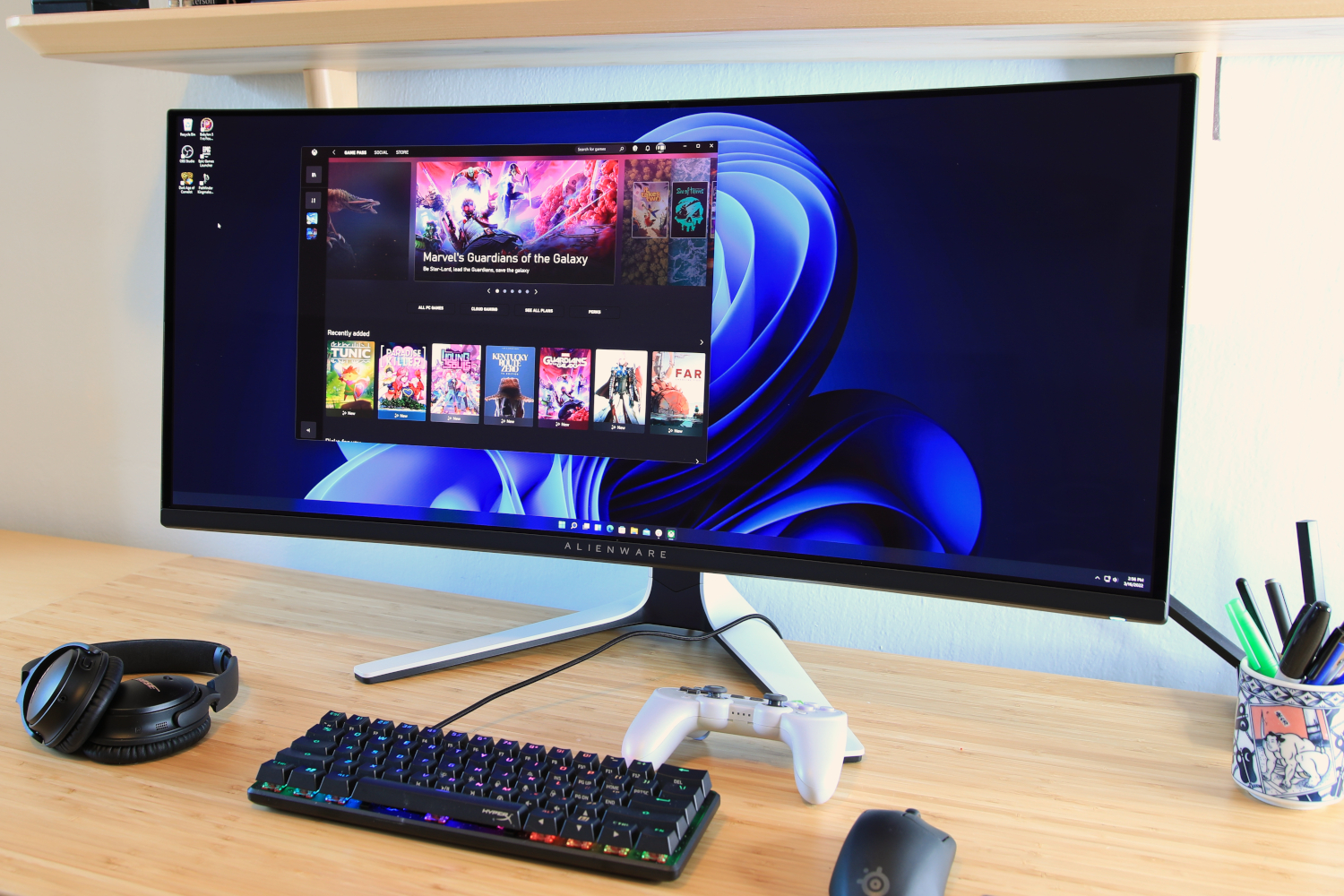
 Read our reviewPrice When Reviewed:$1,299.99Best Prices Today:$899.99 at Dell Home | $904.95 at Walmart | $1,099.99 at Amazon
Read our reviewPrice When Reviewed:$1,299.99Best Prices Today:$899.99 at Dell Home | $904.95 at Walmart | $1,099.99 at Amazon
I can recommend the Dell G3223Q if you want a 32-inch 4K HDR monitor for less than $1,000. The G3223Q outperforms most alternatives. Just be warned the experience is not perfect. If you can, wait for better Mini-LED monitors that (hopefully) should start to arrive later this year.
Best Prices Today: Dell G3223Q
RetailerPrice
Author: Matthew S. Smith
Matthew S. Smith is a freelance technology journalist with 15 years of experience reviewing consumer electronics. In addition to PCWorld, his work can be found on Wired, Ars Technica, Digital Trends, Reviewed, IGN, and Lifewire. Matthew also covers AI and the metaverse for IEEE Spectrum and runs Computer Gaming Yesterday, a YouTube channel devoted to PC gaming history.
Recent stories by Matthew S. Smith:
Pixio PX248 Wave review: A monitor for fashion, flair, and clarity on a budgetBest portable monitors 2024: Displays that go with youBest ultrawide monitors 2024: Let’s get large




